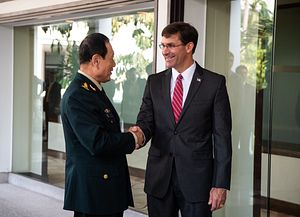U.S. Defense Secretary Mark Esper went to Southeast Asia for the ASEAN Defense Ministers meeting in Bangkok and followed up with a trip to Vietnam, where he spoke against China’s claims and coercion in the South China Sea and announced the transfer of an ex-U.S. coast guard cutter to build up Vietnam’s own coast guard.
In Bangkok, after Esper publicly decried China’s use of intimidation and coercion, China’s defense minister, General Wei Fenghe, reportedly warned in a private meeting for the United States to “stop flexing muscles in the South China Sea and to not provoke and escalate tensions in the South China Sea.” A spokesman then reiterated publicly that “We [call on] the U.S. side to stop intervening in the South China Sea and stop military provocation in the South China Sea.”
But Esper followed up his meetings in Bangkok with a visit to Vietnam, where he reemphasized the United States’ position against China’s tactics in the South China Sea, and announced the coast guard cutter transfer to improve Vietnam’s capacity and capability to push back against China’s harassment.
“China’s unilateral efforts to assert illegitimate maritime claims threaten other nations’ access to vital natural resources, undermine the stability of regional energy markets, and increase the risk of conflict,” Esper told an audience at the Diplomatic Academy of Vietnam. “We will not accept attempts to assert unlawful maritime claims at the expense of law-abiding nations.”
Vietnam and China were embroiled in a maritime standoff this past summer over oil exploration near the South China Sea’s Vanguard Bank. Vietnam called for China to remove survey vessels that were being escorted by coast guard ships and interfering with Vietnam’s own attempts to exploit its exclusive economic zone. The area of the standoff is also within the “nine dash line,” over which China ambiguously claims jurisdictional and economic rights.
Among the flotilla that China sent to the Vanguard Bank was its largest coast guard vessel, the Haijing 3901. Displacing over 12,000 tons, it dwarfs the last ex-coast guard cutter the United States transferred to Vietnam. The United States previously gave Vietnam the ex-USCGC Morgenthau in 2017. The Hamilton-class cutters are nearly 50 years old but large and capable, and armed with a 76-millimeter gun. At over 3,000 tons, the Hamilton class cutters are the size of many naval frigates, but still only a quarter of the size of the 3901. Its size alone is meant to intimidate other countries, who have few options for corralling such a large vessel without using escalating force and risking a clash that might then involve China’s navy.
Vietnam is leery of foreign entanglements, following a policy of “three noes” – no alliances, no foreign bases, and no involving third party countries in disputes. But the lack of options to push back against China’s claims and coercion has led to increasing ties with the United States.

































